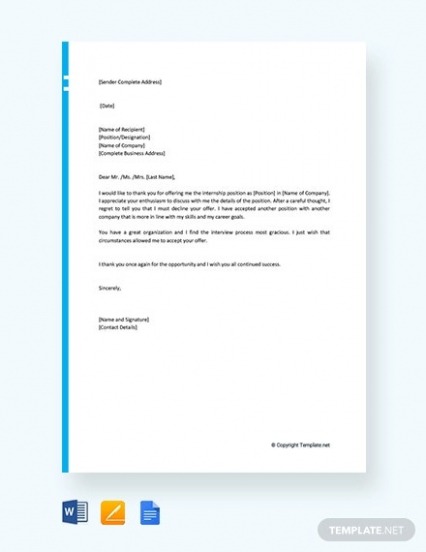Decline Internship Offer Template Sample Taxpayers experiencing tax obligation financial debt troubles rarely contrast the internal revenue service deal in concession with the Phase 13 personal bankruptcy. Regularly, the Chapter 13 will certainly give a extra particular treatment for the taxpayer to settle tax obligation debt. This article checks out the relative benefits of both the offer in concession and Phase 13.

An offer in compromise may be the most marketed tax obligation solution. You can not listen to radio or enjoy television without being pounded by advertisements to resolve your tax debt. Frequently the ads announce that the IRS has actually introduced that compassion in the collection of the tax obligation financial obligation exists for a minimal time. The unfortunate reality is that the compassion announcement by the internal revenue service was typically for other trouble location, such as tax sanctuaries. The internal revenue service turns down roughly 85 percent of all offers in compromise filed as a result of doubt regarding collectibility. Deals in concession are usually filed due to the fact that the taxpayer thinks the tax obligation financial debt can not be paid, Question as to Collectibility is one of the most common kind of deal in concession. Various other types of deals in concession are outside the extent of this article.
The advantage of the deal in compromise is that the tax obligation obligations, including the associated charges as well as interest, are lowered to the amount the internal revenue service as well as the taxpayer concur can be paid. Both parties have to accept the regards to the offer in compromise. The offer in compromise is a contract between the internal revenue service as well as the taxpayer. The regards to the contract can be imposed versus the taxpayer in addition to the internal revenue service.

Approval of the deal in compromise happens when the IRS thinks that the deal is at the very least as long as could be collected by the IRS over the one decade life of the law of restrictions. The internal revenue service will decline an deal that is for a minimal quantity than it can otherwise collect.
The IRS uses a consistent collection of financial requirements that are not versatile in both the evaluation of the amount paid monthly in an installment contract and also in an offer in concession. These criteria restrict the expenses for living that the taxpayer can declare are necessary for living. The criteria include food, housing as well as utilities, transportation, and also out of pocket wellness expenditure. The requirements might create radical troubles for a taxpayer with a moderately higher standard of living. Business expenses are not affected by the standards.
The analysis of the minimum deal in compromise that will certainly make the offer processable is the equity in the taxpayer’s possessions plus the quantity that could be paid in an installation contract over a given period of time. The duration of the future monthly settlements thought about by the internal revenue service relies on just how the offer will be paid by the taxpayer. The IRS wants 48 months of monthly settlement if the taxpayer uses a lump sum. The IRS desires 60 months of month-to-month settlement if the offer is to be paid in a short-term agreement of two years or less. Nevertheless, the IRS will certainly think about factual concerns such as retired life and also health and wellness of the taxpayer in reducing the duration of the multiplier.


